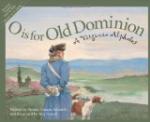Quick, startling, and almost miraculous was the next change in the scene: a change from the emptiness of desolation to the bustling fulness of life and colour—the harbour dotted with ships, the little village crowded with people, James Towne alive again. For even in the dark hour of abandonment, it was not destined that the settlement should perish. Even as the colonists sailed down the James, a fleet bearing reinforcements and stores of supplies was entering the mouth of the river. The settlers were turned back; and following them came the fleet, bringing to deserted James Towne not only new colonists, but pomp, ceremony, and the stately, capable new governor, Lord Delaware.
“He was the one who went to church with so much show and flourish, wasn’t he?” asked Nautica.
“Yes,” answered the Commodore confidently, as he happened to have his book open at the right page. “Lord Delaware attended the little church in the wilderness in all state, accompanied by his council and guarded by fifty halberd bearers wearing crimson cloaks. He sat in a green velvet chair and—”
“Where do you think that church was?” interrupted Nautica.
“Right near here. They say it stood about a hundred yards above the later one whose ruins are over there in the graveyard. And in that church Lord Delaware and his council—”
“Yes,” Nautica broke in again. “That was the church that they were married in—John Rolfe and Pocahontas.”
“To be sure,” said the Commodore. “Let the wedding bells ring. It is time now for the ceremony.”
And a strange ceremony it must have been that the little timber church saw that April day in the year 1614, when the young colonist of good English family linked his fate with that of the dark-skinned girl of the tepee. It was the first marriage of Englishman and Indian in the colony, and meant much to the struggling settlers in furthering peaceful relations with the savages. Speaking in the society-column vernacular of a later day, the occasion was marred by the absence of the bride’s father. The wary old chieftain was not willing to place himself within the power of the English. But the bride’s family was represented by two of her brothers and by her old uncle, Opachisco, who gave her away. Other red men were present. Doubtless the governor of the colony, Sir Thomas Dale, who much approved the marriage, added a touch of official dignity by attending the ceremony resplendent in uniform and accompanied by colonial officials.
It was a strange wedding, party. While the minister (Was it the Reverend Richard Buck or the good Alexander Whittaker?) read the marriage service of the Church of England, the eyes of haughty cavalier and of impassive savage met above the kneeling pair and sought to read each other. And a strange fate hung over the pale-face groom and the dusky bride—that in her land and by her people he should be slain; that in his land and among his people she should die and find a lonely grave beside an English river.




